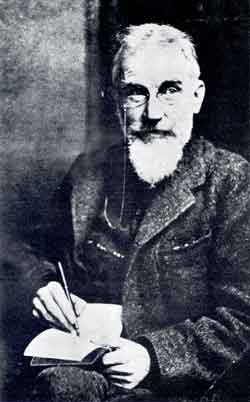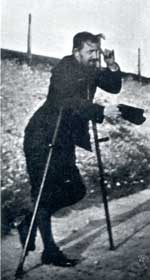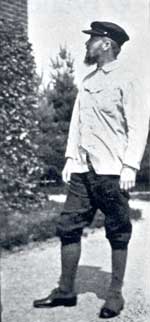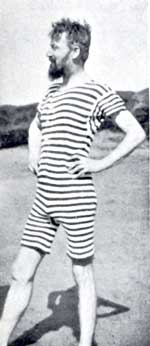|
Loading
|
|
|
 The
Stage History and of Shaw's O'Flaherty VC
The
Stage History and of Shaw's O'Flaherty VC
by Joe Mitchenson
"O'Flaherty V.C." originally subtitled "An Interlude in the Great War", later changed, on publication in 1919, to "A Reminiscence of 1915 (A Recruiting Pamphlet)", was written in 1915 for the Abbey Theatre, Dublin, and was announced for production there on 23 November 1915.
Because of the war they were afraid of a riot in the theatre and could not risk closure So it was quickly withdrawn.
Shaw was never dismayed with the loss of an intended first production, and true to pattern swiftly looked for any means available to get the play staged. His friend, the actor and airman Robert Loraine, was at that time an officer in the Royal Flying Corps on the Western front, stationed at Treizeenes in Belgium, commanding the 40th Squadron. Shaw sent him the play to produce in a mixed entertainment at "The Theatre Royal" for the troops, and managed himself to attend a dress rehearsal while on an official visit to the Western Front. The performance was 21 February 1917.
Shaw himself read the play from 2 L.O. Savoy Hill as his broadcasting debut on 20 November 1924, but till the Mermaid production the play had not been publicly performed in London.
 |
 |
 |
Recruiting the Irish
(An extract from Shaw's Preface to "O'Flaherty VC")
It may surprise some people to learn that in 1915 this little play was a recruiting poster in disguise. The British officer seldom likes Irish soldiers; but he always tries to have a certain proportion of them in his battalion, because Irish soldiers give impetus to those military operations which require for their spirited execution more devilment than prudence. ..
Unfortunately, Irish recruiting was badly bungled in 1915. The Irish were for the most part Roman Catholics and loyal Irishmen, which means that from the English point of view they were heretics and rebels. But they were willing enough to go soldiering on the side of France and see the world outside Ireland, which is a dull place to live in. It was quite easy to enlist them by approaching them from the point of view of Dublin Castle. To attract them, the walls were covered with placards headed REMEMBER BELGIUM. The folly of asking Irishmen to remember anything when you want him to fight for England was apparent to everyone outside the Castle: FORGET and FORGIVE would have been more to the point. ...
As for me, I addressed myself quite simply to the business of obtaining recruits. I knew from my personal experience and observation, that all an Irishman's hopes and ambitions turn on his opportunities of getting out of Ireland. Stimulate his loyalty, and he will stay in Ireland and die for her. Appeal to his discontent, his deadly boredom, his thwarted curiosity and desire for change and adventure, and, to escape from Ireland, he will go abroad and risk his life for France, for the Papal States, for secession in America, and even, if no better may be, for England. ...
There was another consideration ... No one will ever know how many men joined the army in 1914 and 1915 to escape from tyrants and taskmasters, termagants and shrews, none of whom are any the less irksome when they happen by ill-luck to be also our fathers, our mothers, our wives and our children. Even at their amiablest, a holiday from them may be a tempting change for all parties. That is why I did not endow O'Flaherty, V.C. with an Ideal Irish colleen for his sweetheart, and gave him for his mother a Volumnia of the potato patch rather than an affectionate parent from whom he could not so easily have torn himself away.
I need hardly say that a play thus carefully adapted to its purpose was voted utterly inadmissible.